Iraqi Navy
The Iraqi Naval Forces (Arabic: القوات البحرية العراقية), or the Iraqi Navy, is the naval warfare service branch of the Armed forces of Iraq. Formed in 1937, initially as the Iraqi Coastal Defense Force, its primary responsibilities was the protection of Iraq's coastline and offshore assets, the official name was changed on 12 January 2005 to Iraqi Naval Forces[4]
| Iraqi Naval Forces | |
|---|---|
| القوات البحرية العراقية | |
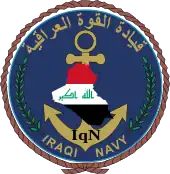 Emblem of the Iraqi Navy | |
| Founded |
|
| Country | |
| Type | Navy |
| Role | Naval warfare |
| Size | 25,000 personnel (2023)[2][3] |
| Part of | Iraqi Armed Forces |
| Headquarters | Baghdad, Iraq |
| Colors | Blue, White & Olive |
| March | March of the Navy |
| Anniversaries | 12 January |
| Equipment | see below |
| Engagements | World War II Anglo-Iraqi War Iran–Iraq War Invasion of Kuwait Gulf War 2003 invasion of Iraq |
| Commanders | |
| Commander-in-chief of the Navy | Rear Admiral Ahmed Jasim |
| Chief of Staff of the Navy | Rear Admiral Faris Salman |
| Notable commanders | Vice Admiral Mohammad Abdullah al-Ka'abi |
| Insignia | |
| Ensign | 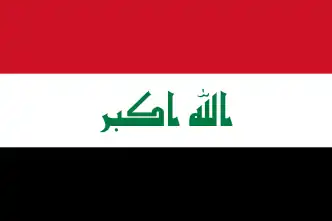 |
| Flag |  |
As of February 2021, the navy had approximately 3,000 sailors and marines which form an Operational headquarters, five afloat squadrons, and two marine battalions.[5]
Headed by Rear Admiral Muhammad Jawad, the navy had plans to build six Al Uboor-class patrol boats in Baghdad, with the first of the boats to enter service in September 2005. This project however, was ultimately canceled. Additionally, two Assad-class corvettes built for Iraq in the 1980s by Italy were originally planned to be delivered sometime around 2006–2007. The ships however, were found to be in a worse state than originally believed, forcing the Iraqi navy to reconsider the deal and instead buy 4, newer, smaller modified-Diciotti class vessels. The 5 British corvettes and 1 Soviet patrol boat operated by the Saddam Hussein-era Iraqi Navy were destroyed in the 1991 Gulf War and the 2003 U.S. invasion of Iraq, respectively.
The Iraqi Navy is designed for coastal water protection; preventing the smuggling of people, oil and weapons; and to protect the country's oil platforms. As a result, it mainly needs patrol boats. These may be backed up by fast attack craft. The patrol boats need to have the ability to launch rigid-inflatable boats (RIBs) for boarding ships and also possibly be able to accommodate a helicopter which would increase their patrol capability. The Iraqi Navy is building a second Marine battalion.[6] In 2016 the Iraqi Navy awarded money to a ship maintenance company to sustain its current fleet of ships.
History
Kingdom of Iraq
The Royal Iraqi Navy was formed in 1937 as a small four-ship force headquartered in Basra. Between 1937 and 1958, it was primarily a riverine force.
Iraqi Republic (pre-2003)
.svg.png.webp)
Following the 14 July Revolution of 1958, the Iraqi Navy began to expand. Operationally based in the port of Umm Qasr, the Arabic Gulf Academy for Sea Studies was established in Basra, which offered a bachelor's degree in war and engineering naval studies. By 1988, the Navy grew to a force of 5,000, but played a relatively small role during the 1980–1988 Iran–Iraq War. Much of the Navy was destroyed during Operation Pearl.
Between 1977 and 1987, the Iraqi Navy received eight Osa-class missile boats, armed with Styx anti-ship missiles, from the Soviet Union. It also purchased four Lupo-class frigates and six Assad-class corvettes from Italy, although these were never delivered because of international sanctions following the Iraqi invasion of Kuwait in 1990.[7]
The Iraqi Navy was almost completely destroyed by the Royal Navy during the Gulf War of 1991. The force had 19 ships sunk and 6 vessels damaged. In total, more than 100 Iraqi ships were destroyed. The Navy was not rebuilt and played little part in the Iraq War (2003). One exception was two mine warfare vessels captured by US Navy and Coast Guard units during the assault on Al Faw; The tug Jumariya, towing a well camouflaged minelaying barge, and the tug Al Raya, which had been outfitted as a minelayer itself.[8] Of the units that remained by late 2002, most were in a poor state of repair and the crews were in a poor state of readiness. Whatever units that remained after 1991 were used primarily for safeguarding Saddam's palaces on the Tigris river.
Republic of Iraq (post-2003)
In January 2004, the Iraqi Coastal Defense Force (ICDF) officially began training its first 214 volunteers.
On 30 September 2004, the ICFD assumed the responsibility of protecting the Iraqi coastline, with actual patrol operations beginning the following day, on 1 October 2004.[10]
On 11 November 2008, Rear Admiral Muhammad Jawad signed the historic non-legally binding Khawr Abd Allah Protocols or "KAA Protocols" at the Kuwait Naval Base.[11] The protocols were the concept of the British Royal Navy in 2008 when in command of Combined Task Force 158 operating in the northern Gulf region and specifically within Iraqi territorial waters for the protection of the Iraqi oil terminals Al Basrah Oil Terminal and in support of Iraqi maritime boundaries. They are a non-legally binding military agreement aiding deconfliction between the maritime forces of Kuwait and Iraq in the Khawr Abd Allah waterway and are reflected in a former United Kingdom Hydrographic Office chart and which was re-titled the "KAA Interoperability Admiralty Chart".
The protocols were developed, written and mediated by a British Royal Marine barrister; Lieutenant Colonel David Hammond, RM;[10] working alongside the heads and staffs of both the Kuwaiti Navy and Iraqi Navy and which saw the historic first meeting on board a British warship HMS Chatham (F87) on 8 May 2008. The protocols were historically ratified and signed on 11 November 2008 at Kuwait Naval Base in the presence of Vice-Admiral William Gortney, USN; commander of the United States Naval Forces Central Command based in Bahrain and remain an enduring success story in the region highlighting co-operation and co-ordination between the two countries.
On 30 April 2010, Iraqi naval forces took over responsibility for the protection of the Khawr al-Amaya and Basra oil terminals, as well as the ports of Umm Qasr and al-Zubair.
Organization
Commands
Iraqi Naval Headquarters: Baghdad (Camp Victory).
May move to Umm Qasr.
Operational Headquarters: Umm Qasr
- Tactical Operations Center: Khawr al-Amaya Platform
- Tactical Operations Center: Al Basrah Platform
Naval Training Center: Umm Qasr
- NCO Academy
- Swiftboat Crew Training Course
Maritime Academy: Basrah
Diving Squadron: Umm Qasr
RHIBs
Patrol Squadron: Umm Qasr
PS701, PS702, PS703, PS704, PB301, PB302, PB303, and 5× U/I PBs.
Patrol Squadron: planned
Patrol Squadron: planned
Patrol Squadron: planned
Small Boat Squadron: Umm Qasr
Squadron equipped with American Defender Class boats.
Support & Auxiliary Squadron: Umm Qasr
Marines
1st Marine Brigade Special Troops Battalion: Basrah Log City
In December 2010 was redesignated 1st and moving to Basrah Log City. Reached full strength in 2011.
- 1st Marine (Wolverines) Battalion: Umm Qasr
- 2nd Marine Battalion: Umm Qasr/Az Zubayr
- 3rd Marine Battalion: Basrah Log City
- 1st Marine Bde Base Support Unit: Basrah Log City
2nd Marine Brigade Special Troops Battalion: planned
planned
Bases
Umm Qasr:
Personnel
_celebrate_as_they_get_underway_for_the_first_time.jpg.webp)
5,400 sailors and officers, in addition to 1600 in the Iraqi Naval Battalion (marines) who guard the platforms and the port of Umm Qasr.
| Commanders | Dates |
|---|---|
| Vice Admiral Ali Hussain Ali | 2009 to 2016 |
| Rear Admiral Muafaq Najim Abid | 2009 to 2020 |
| Rear Admiral Ahmed Jasim | 2020- |
Officers
| Rank group | General/flag officers | Senior officers | Junior officers | Officer cadet | ||||||||||||||||||||||||||||||||
|---|---|---|---|---|---|---|---|---|---|---|---|---|---|---|---|---|---|---|---|---|---|---|---|---|---|---|---|---|---|---|---|---|---|---|---|---|
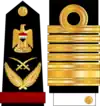 |
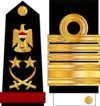 |
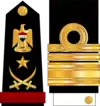 |
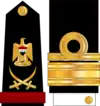 |
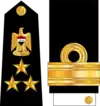 |
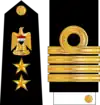 |
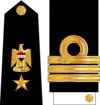 |
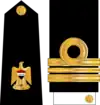 |
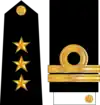 |
 |
 |
||||||||||||||||||||||||||
| مشیر Mushir |
فريق أول Fariq 'awal |
فريق Fariq |
لواء Liwa |
عميد Amid |
عقيد Aqid |
مقدم Muqaddam |
رائد Ra'id |
نقيب Naqib |
ملازم أول Mulazim awwal |
ملازم Mulazim |
||||||||||||||||||||||||||
Ratings
| Rank group | Senior NCOs | Junior NCOs | Enlisted | |||||||||||||||||||||||||||||||||
|---|---|---|---|---|---|---|---|---|---|---|---|---|---|---|---|---|---|---|---|---|---|---|---|---|---|---|---|---|---|---|---|---|---|---|---|---|
 |
 |
 |
 |
 | ||||||||||||||||||||||||||||||||
| رقيب أول Rayiys eurafa |
رقيب Arif |
نائب عريف Nāyīb arīf |
جندي أول Jundi 'awwal |
جندى Jundi | ||||||||||||||||||||||||||||||||
Equipment
Assad-class corvettes
A total of six ships were ordered by Iraq in the 1980s, but were never delivered as a result of the arms embargo imposed after the Gulf War in 1991. Four of the six ships were eventually purchased by the Royal Malaysian Navy in October 1995 as the Laksamana-class corvette, while the remaining two were mothballed at La Spezia. On 19 May 2017, it was reported that the remaining two vessels would be delivered to the Iraq Navy after 26 years. They eventually left La Spezia on a semi-submersible carrier Eide Trader on 22 May and reached Iraq in June 2017.[13]
Saettia Mk4/Fattah OPV
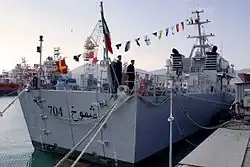
On 15 February 2005 the Iraqi Navy signed a $101 million contract with the Italian Government to provide four Saettia MK4 class Offshore-Patrol Vessels.[14][15][16]
This is a modified Diciotti class offshore patrol boat, as originally used by the Guardia Costiera. The vessels are to be built by Fincantieri at Riva Trigoso, with modifications including increased crew capacity of 38. The contract also comprises the provision of logistical support and crew training with each crew completing a 7-week training course. In cooperation with the Marina Militare (Italian Navy), each commissioning crew is provided with a week's bridge simulator course at the Academy in Livorno.[14]
_Patrol_Craft_102_prepares_to_moor_in_Manama%252C_Bahrain.jpg.webp)
In May 2009, the first vessel, Patrol Ship 701 named Fatah (Arabic for Opening), was handed over at the Muggiano, La Spezia shipyard. The crew had been training since January 2009, and would now be heading for Umm Qasr, a 20-day/5,000 nautical miles journey via the Mediterranean, Suez Canal and Red Sea.[15] There, additional training will be completed, before the vessel takes over duties from the British Royal Marine patrols, who will then revert to a training role of new crew.[15] The vessels will be used to patrol the exclusive economic zone, control maritime traffic, for search and rescue and fire fighting.
Al Basra class OSV
- 2 × Al Basra-class offshore support vessel
- 401 Al Basra
- 402 Al Fayhaa
Offshore Patrol Vessels
The fifteen (15) 35-meter Patrol Vessels (P301 – P315) were built by Swiftships in the period 2011–2014.[17] The ships will provide logistical support for securing the oil platforms, to the Interceptor boats and more than 60 Fast Attack boats.[18][19][20]
Predator class
The five 27-meter Predator (NHS615) Class patrol boats: (P-101), (P-102), (P-103), (P-104), (P-105); were built by Wuhan Nanhua High-speed Ship Engineering Co., Ltd. and delivered in 2002, they were to be the new ICDF's first ships and were to be purchased under the oil-for-food program. Due to their military compatibilities they were not allowed to enter Iraq until 2003. The vessel has one(1) continuous freeboard main deck with camber and slight fore sheer, one deck house and wheelhouse. The hull below main deck is divided by transversal bulkheads into 4 spaces. The speed of the vessel under sea trial conditions is 32 knots. Crew: 14.[21]
Supply vessels
- 1 offshore supply vessel
- Al Shams (Sun):[22] September 2006, an Iraqi marine company will deliver a new ship (Al Shams or the Sun) which was bought from Iraqi aquatic transportation company to be employed as guiding afloat station across the sea in order. In March 2010, the Iraqi Navy awarded a US$70 million contract through FMS to RiverHawk Fast Sea Frames, LLC, Tampa, Florida for two 60-metre offshore support vessels.[23] The two vessels were delivered on 20 December 2012.[24]
List of fleets
| Class | Names / pennant number | Type | Photo | Number of Ships | Notes |
|---|---|---|---|---|---|
| Corvette | |||||
| Assad-class corvette | Musa ibn Nusayr (F210) Tariq ibn Ziyad (F212) |
corvette | 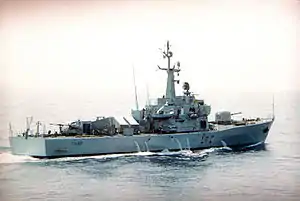 |
2 | |
| Offshore patrol vessel | |||||
| Saettia Mk4/Fattah-class | Fateh (PS 701) el-Naser (PS 702) Majid (PS 703) Shmookh (PS 704) |
Offshore patrol vessel |  |
4 | |
| Offshore support vessel | |||||
| Al Basra-class | Al Basra (OSV 401) Al Fayhaa (OSV 402) |
Offshore support vessel | .jpg.webp) |
2 | |
| Fast attack craft | |||||
| Swiftships Model 35PB1208 E-1455 | (P-301) (P-302) (P-303) (P-304) (P-305) (P-306) (P-307) (P-308) (P-309) (P-310) (P-311) (P-312) (P-313) (P-314) (P-315) |
fast attack craft | 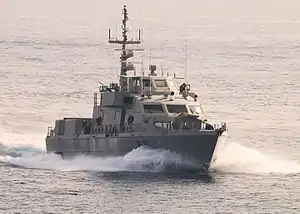 |
15 | |
| Predator class | (P-101) (P-101) (P-102) (P-103) (P-104) (P-105) |
fast attack craft | _Patrol_Craft_102_prepares_to_moor_in_Manama%252C_Bahrain.jpg.webp) |
10 | |
| Fast aluminum boats | |||||
| Fast Aluminum Boats | Patrol boat | 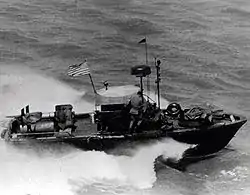 |
24 | ||
| Rigid-hulled inflatable boats | |||||
| Rigid-hulled inflatable boat | RHIB | 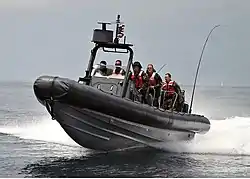 |
10 | ||
| Supply vessel | |||||
| Al Shams-class | Al Shams | Supply vessel | 1 | ||
Future procurement
The Iraqi Navy will reportedly be purchasing ScanEagle UAVs in the near future for maritime reconnaissance support. Exact numbers and delivery dates are still unknown as of January 2012.[25]
References
- "Forces de surface". Ministère des Armėes. Retrieved 29 August 2021.
- "World Air Forces 2019". Flightglobal: 16. Retrieved 7 August 2019.
- John Pike. "Iraqi Navy". Globalsecurity.org. Retrieved 13 November 2010.
- International Institute for Strategic Studies (25 February 2021). The Military Balance 2021. London: Routledge. p. 341. ISBN 9781032012278.
- DJ Elliott (4 July 2008). "Iraqi Security Forces Order of Battle: July 2008 Update". The Long War Journal. Retrieved 13 November 2010.
- "Iraqi Navy". Global Security. 7 September 2005. Retrieved 25 May 2008.
- "Ship to Shore Logistics – 04 (History – 2003 Iraq)". Think Defence. 5 August 2013. Archived from the original on 26 September 2013. Retrieved 26 August 2013.
- Biography for use by organization and for public information and dissemination (2013). "David Hammond, Barrister-at-law (Biography)" (PDF). Uploads. 100 Series Rules. Retrieved 12 February 2016.
- "Press Release". Cusnc.navy.mil. 2 December 2008. Archived from the original on 14 June 2011. Retrieved 13 November 2010.
- "Iraq's Assad corvettes delivered after 26-year delay". IHS Janes. Retrieved 16 July 2017.
- "Iraqi Navy Patrol Ship 701 named Fatah handed over at Fincantieri". defpro.com. 16 May 2009. Archived from the original on 18 May 2009. Retrieved 16 May 2009.
- Owen, Richard (16 May 2009). "Iraq's fledgling navy takes possession of its first naval patrol boat". The Times. London. Retrieved 16 May 2009.
- "Patrol Vessel". Fincantieri.it. Retrieved 13 November 2010.
- "Swiftships Shipbuilder". Shipbuilding History. Retrieved 18 April 2022.
- "US Navy". Naval Today. 12 July 2013. Retrieved 18 April 2022.
- "Royal Navy". Gov.UK. Retrieved 18 April 2022.
- "US Navy". United States Navy Recognition. Retrieved 18 April 2022.
- "Wuhan Nanhua High speed Ship Engineering Limited liability company". Archived from the original on 21 May 2013. Retrieved 26 February 2013.
- "Iraqi Security Forces Order of Battle" (PDF). longwarjournal.org. 30 April 2009. Retrieved 21 June 2023.
- "Senators move to promote offshore wind development". Retrieved 10 November 2014.
- Channel News Asia
- "'Every brigade has its own drone': An interview with Major General Jeff Buchanan". Retrieved 10 November 2014.
External links
- DefendAmerica News - Iraqi Navy Ships to be Built in Baghdad
- Navy League of the United States - Citizens in Support of the Sea Services
- iraqieconomy.org
- CPA-IRAQ.org: Homepage of The New Iraq - Information about the Iraqi Dinar
- David Axe – On Its Own: The Iraqi Navy in 2005 – Proceedings, August 2005
- David Axe – Resurrection – Sea Power, November 2005
- 武汉南华高速船舶工程股份有限公司
- Meet the Head of the New Iraqi Navy - Meet the Head of the New Iraqi Navy, March 17, 2007